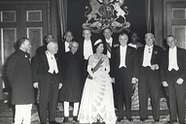The Roundup Top Ten for September 16, 2022

Black Historians Know There Has Never Been Objectivity in Writing the Pastby Keisha N. Blain"Black historians have long recognized the role of the present in shaping our narratives of the past. We have never had the luxury of writing about the past as though it were divorced from present concerns." |

Barbara Ehrenreich Challenged Readers to Examine Themselvesby Gabriel WinantThe journalist and social theorist wrote to force her readers to examine their own positions in society's hierarchies, not to encourage cynicism of futility, but to encourage them to see change as a long haul. |

Today's Book Bans Might be Most Dangerous Yetby Jonna PerrilloToday's book banners have broadened their attention from communist themes in textbooks and are attacking young adult literature titles that students are choosing to read, a much more significant intrusion on freedom of thought. |

Historicizing the Legitimacy of LGBTQ Historyby Marc SteinThe AHA's newsletters reveal a protracted and frequently bitter debate about the boundaries of the discipline as scholars in the early 1970s worked to establish gay and lesbian people and communities as subjects of study. |

On Climate, the British Monarchy Mortgaged the Planet's Futureby Priya SatiaThe monarchy, as a cultural core of the British empire, papered over the separation and alienation among humans resulting from the conversion of the Earth to a set of exploitable commodities. |

The Historical Roots of "Florida Man"by Julio Capó, Jr. and Tyler GillespieThe internet meme "Florida Man" signals a caricature of the presumed recklessness and ignorance of the state's population. But these stories have a long history of justifying colonialism and profiteering in the Sunshine State, and stand in the way of progress today. |

Economism as a Red Scare Legacyby Landon StorrsAn economic historian traces the rise of neoliberal political economy to the post-WWII Red Scare, when Keynesians were driven out of government service under suspicion of disloyalty. |

Mourn the Queen, Not the Empireby Maya JasanoffAs the head of the postwar British Commonwealth, the Queen symbolized the effort to put the brakes on the global wave of decolonization, including deadly and secret campaigns of state violence in Northern Ireland, Kenya, and elsewhere. |

Black Mississippians Have Been Fighting a Water Crisis for Decadesby Thomas J. Ward Jr.Black residents of the Mississippi Delta began organizing in 1970 for access to water and sewage services; their struggle continues today. |

Queen Not Innocent of Empire's Sinsby Howard W. French"I bear no ill will toward her following her death. Her empire—and empires more generally—though is another matter." |